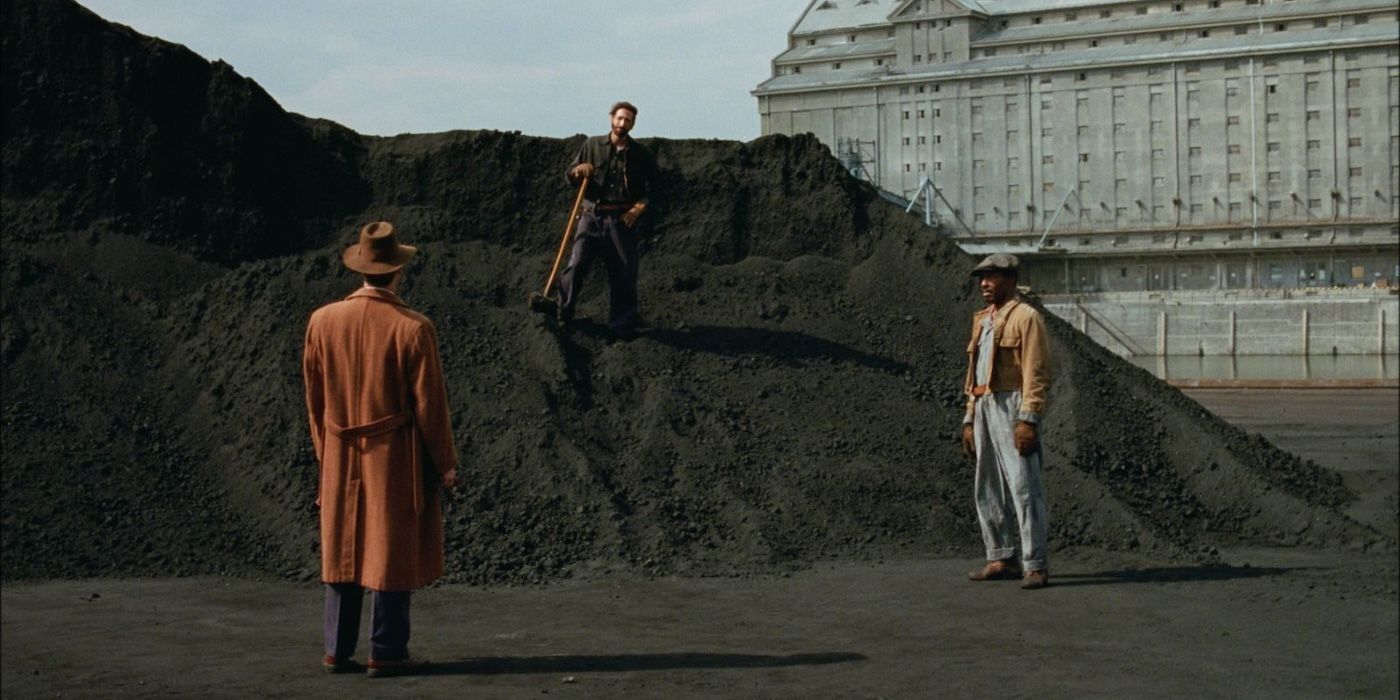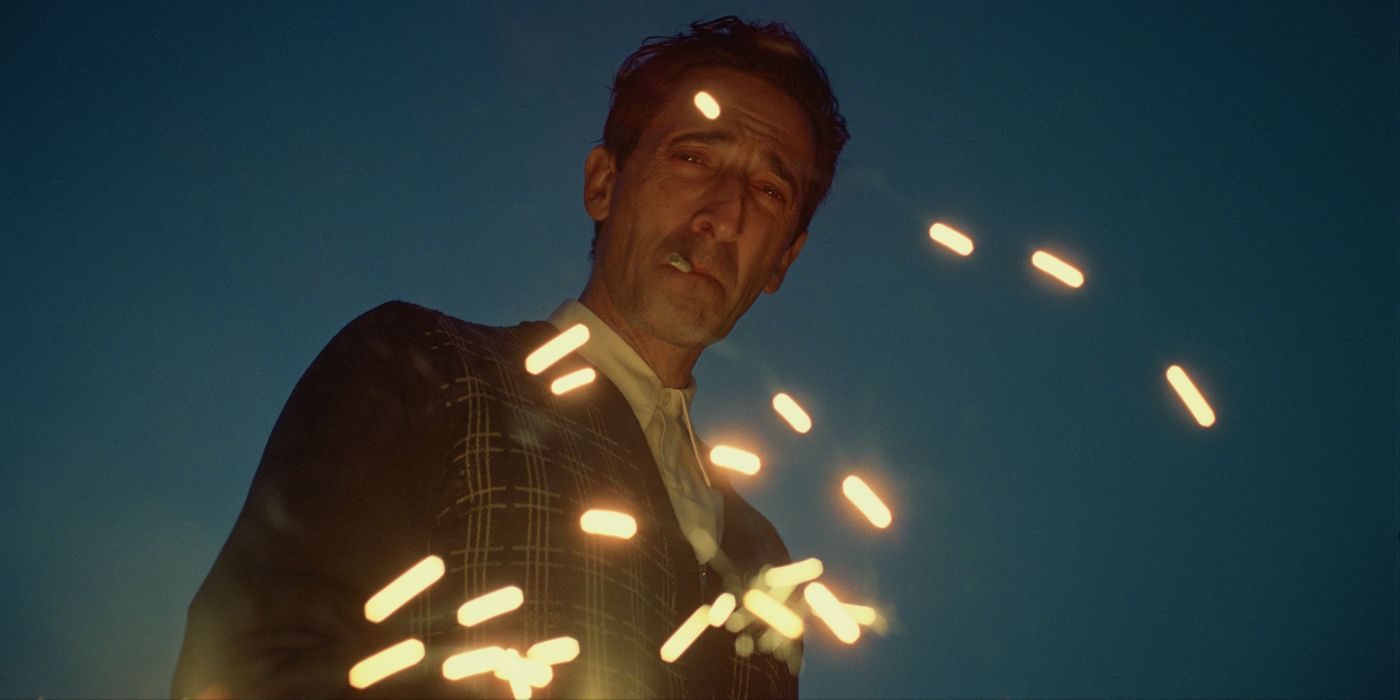

Sign in to your Collider account
Summary
- Collider's Perri Nemiroff sits down with Adrien Brody to discuss The Brutalist.
- Director Brady Corbet's film is a tale of the immigrant experience through the journey of a Hungarian-Jewish architect in America post WWII.
- In this interview, Brody shares his personal connection to his character, his preparation process for his roles, and his admiration for Corbet's dedication to his vision.
In addition to his inspiring performances, Academy Award winner Adrien Brody was a match made in filmmaking heaven for co-writer and director Brady Corbet on his third feature film, The Brutalist. This three-and-a-half-hour epic has been garnering critical praise since its World Premiere at the Venice International Film Festival, and that's in no small part due to both Corbet's unyielding vision and the ensemble cast.
The Brutalist is Corbet and partner and co-writer Mona Fastvold's tale of an immigrant's experience in America post World War II, a time of reconstruction. In the movie, Brody plays László Tóth, a successful Hungarian-Jewish architect who sets off for a new beginning and finds himself in collaboration with a wealthy businessman, Harrison Lee Van Buren (Guy Pearce), who's commissioned his talents for a structure that will put Van Buren on the map. The movie also stars Felicity Jones as Erzsébet, Tóth's wife, who offers her support but is reckoning with the trauma of her past.
Talking with Collider's Perri Nemiroff, Brody opens up about his preparation process before stepping on set and how he views it less as acting ("I hate the term "acting.") but rather "inhabits a character" wholly. He shares how László's story reflects his mother's (Hungarian-American photographer Sylvia Plachy) own "aspirations and journey", how his own experiences gave him unique insight into the role, and his admiration and trust for Corbet's "fearless and tenacious" approach to filmmaking.
'The Brutalist' Was a Deeply Personal Experience for Adrien Brody
"This journey parallels my mother's."
PERRI NEMIROFF: I want to start with a big two-part question about your prep process, because this seems like such an ambitious project with so many creatively fulfilling challenges to it. What is something about your approach to preparing for roles that has stayed the same from film to film, but then also, what is something about The Brutalist that called for something unique?
ADRIEN BRODY: This is a wonderful two-part question. I always need to feel like the least amount of acting I can do, the better I can be if that makes sense. I hate the term “acting” because it’s so superficial and so surface. But to inhabit someone, the beauty of film is that you can have these moments of distilling another time and place and context of events and experiences in another individual. It can be shaped and form a life of a human being that isn't yourself. And the only way to do that is to really find a way to connect in every one of those moments and not let one slip by.
Every time one slips by, it's a failure. It's a personal failure. It doesn't matter what's happening on set or who's doing what in your eyeline or who said what to you or what you're contending with in your personal life. No one knows. No one cares. What is left is living on. It's a big responsibility. So, every movie I do, whether it's a comedy or a heavy dramatic film where I honor a real individual or represent something that is worthy of us speaking about, is a similar need to either do the homework or do what it takes to not make-believe. A lot of it comes with imagination and being present, but if it requires some specific homework, I have to do that.
Then, in this film, I had the luxury of living it and living with an understanding of the immigrant experience, the yearnings of an artist, and the yearnings of, more specifically, my mother, being a Hungarian refugee who moved to New York, moved to America, and her aspirations and journey as an artist to leave behind something which parallel László’s experiences and this journey parallels my mother's.
"The Permanence of Film Is Like the Construction of an Architectural Work"
Brody discusses the passion of director Brady Corbet.

I was reading some quotes Brady gave about how he was comparing architecture to filmmaking, and he said something to the effect of, architecture and filmmaking have a lot in common. He goes on to say, "The Brutalist, for me, was a way of talking about the more bureaucratic aspect of the artistic process." That was making me wonder, did working on this movie and exploring that theme, but through architecture, impact your artistic process at all?
BRODY: 100%. Also, to have such a deep, intimate friendship ensue and trust for a filmmaker, and for him to be so free with sharing his own struggles and how they pertain to his yearnings in making films in the first place is such guidance both from a creative perspective and my yearnings. And the need to not acquiesce all the time, and the struggle for a filmmaker to fight for the vision, the specificity, the need for VistaVision, even though that's going to be much more cumbersome, the need to insist that the movie doesn't, at the end, go on a portal so that people will actually see it in a theater on a 70-millimeter projection because that is what it is intended for, and that is how the most depth and complexity will be revealed is admirable. It's admirable and it’s challenging, but it's done for integrity and devotion, and again, the same objective, to leave behind something and leave behind the emotional experience for the audience. There is something about the permanence of film that is like the construction of an architectural work.
'The Brutalist' Came With Great Sacrifice and Fearlessness
I know with certainty that nobody on this planet could direct The Brutalist the same way Brady did. Is there anything you observed him doing on set that could maybe speak to that singularity and why this film is so uniquely his own?
BRODY: It's very personal to Brady. It's very personal to his journey. It's personal to the journey of many, but because he understood it and was fearless and tenacious — and not fearless in the sense that he was unafraid, but fearless in the sense that he sacrificed and lived in debt and made something enormous out of nothing — and did it with grace, and not only conjured a wonderful, evocative performance from me but from every other character in this film, in the most day players in one moment full of emotion and sensitivity, in a connection between my character and one woman he meets, and in two hours of filming, and the significance of that and the longing, it just breaks my heart. It's just too good. It's just too good. That's what we all strive to do, and he did it, and he fought for it. And he did it with grace, and that's hard to do.
Fighting for a vision and doing so with grace is like music to my ears.
BRODY: Mine, too, by the way! I’ve been doing this a long time. [Laughs]
The Brutalist opens in select theaters on December 20.

Your changes have been saved
When visionary architect László Toth and his wife Erzsébet flee post-war Europe in 1947 to rebuild their legacy and witness the birth of modern America, their lives are changed forever by a mysterious and wealthy client.
Director Brady Corbet
Writers Brady Corbet , Mona Fastvold










 English (US) ·
English (US) ·